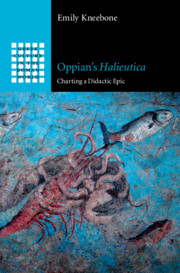Book contents
- Oppian’s Halieutica
- Greek Culture in the Roman World
- Oppian’s Halieutica
- Copyright page
- Epigraph
- Contents
- Acknowledgements
- Introduction: On Fishing
- Part I Didactic Poetry
- Part II Morality at Sea
- Chapter 4 Guile
- Chapter 5 Greed
- Chapter 6 Lust
- Part III Humans and Animals
- Part IV The World Is a Sea
- Bibliography
- Subject Index
- Index Locorum
Chapter 6 - Lust
from Part II - Morality at Sea
Published online by Cambridge University Press: 24 September 2020
- Oppian’s Halieutica
- Greek Culture in the Roman World
- Oppian’s Halieutica
- Copyright page
- Epigraph
- Contents
- Acknowledgements
- Introduction: On Fishing
- Part I Didactic Poetry
- Part II Morality at Sea
- Chapter 4 Guile
- Chapter 5 Greed
- Chapter 6 Lust
- Part III Humans and Animals
- Part IV The World Is a Sea
- Bibliography
- Subject Index
- Index Locorum
Summary
Images of fluidity saturate this proem, which dramatises the transposition of Eros or desire to the sea. In a richly multisensory constellation of images, the Muses are said to have ‘crowned’ the poet with the gift of song, providing him with a sweet stream (γλυκὺ νᾶμα) to blend (κίρνασθαι) for his imperial addressees (4.10). The verb κίρνασθαι connotes the mixing of wine with water, depicting the poem as a drink to be consumed by the emperor, and exploiting the aquatic connection between its marine subject-matter (εἰνάλιος, 4.6) and the potable nature of the poetic drink. The adjective γλυκύς in turn suggests both the aesthetic appeal of this ‘sweet’ or delightful verse and an implied thematic contrast between brine and fresh water. The mixing metaphor thus advertises the skilful nature of the poet’s didactic role in transforming the raw materials of the salty sea into a palatable literary draught that benefits both ears and mind (οὔασι καὶ πραπίδεσσι, 4.10), imparting knowledge and pleasure to the audience in an expertly judged blend. The metaphor of ‘mixing’, I suggest, amounts to a manifesto for the poet’s didactic enterprise, drawing on ancient critical debates about the proper ‘educative’ or ‘entertaining’ function of poetry;1 it also sets out the poet’s wider literary and ethical agenda of the ‘blend’ or well-judged mean.
- Type
- Chapter
- Information
- Oppian's HalieuticaCharting a Didactic Epic, pp. 167 - 206Publisher: Cambridge University PressPrint publication year: 2020

